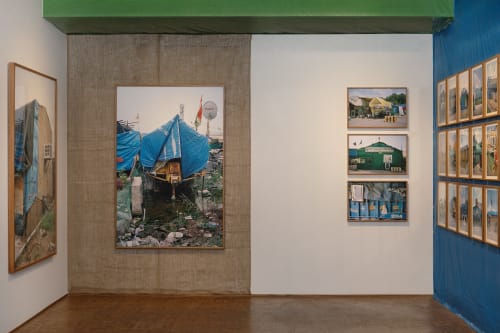Gill created the series The Village on the Highway from January to December 2021, as a visual homage to the creative ingenuity of the farmers contesting the proposed deregulation of agriculture that would further imperil their already fragile livelihoods. They remained on the roads leading into New Delhi through the COVID-19 pandemic and the extremes of the North Indian climate, including the freezing cold, searing heat and a dengue festering monsoon, transforming the farming vehicles that they arrived on, such as tractors, trolleys and tempos, into temporary makeshift homes. Gill was drawn to what she has called ‘an unusual, handmade and homegrown architecture of resistance, in which doors appeared through tarpaulin, and walls arose from bamboo’. Using a large analogue camera, she documented domestic, daily objects such as cooking pots, water tanks, khus coolers and mosquito nets, all of which innovatively enabled communal spaces for cooking, washing, bathing, storage, resting, reading, etc. The road itself was reconfigured into patches of earth to plant vegetables that provided sustenance. Guided by the Sikh tenets of langar, or communal food sharing, and seva, or selfless service, the farmers fed all who came, including the police opposing them, and members of the impoverished local population.
Through this work, Gill highlights the struggle’s inspired strategies, as well as it’s unique temporality over a long year. The ephemeral structures that housed the farmers revealed the dignified tenacity of these rural workers; and their photographic record marks a continuation of her practice which has continually focused on ‘how people in precarity find ways to float, rather than drown’.
In a unique presentation, Gill chooses to ground the gallery exhibition within the corporality of the protest site. Bringing in the materials used by the farmers as a way to frame the photographs, she reinforces the urgent inventiveness of scarce rural resources.

